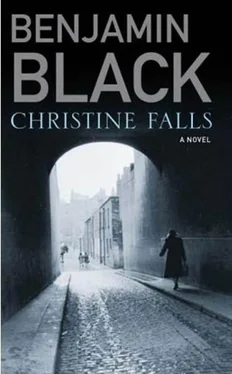“Yes. He’s left her a lot of money.”
“And how do you feel about that?”
She threw up her head and laughed without sound.
“Oh, I feel fine,” she said. “Don’t worry, I get the bulk of the dough, if that’s what you mean-and God knows there’s plenty of it. But she’ll be a rich girl, will Phoebe.”
“I’m sorry to hear it.”
“Why-don’t you want her to be an heiress?”
“I want her to have an ordinary life.”
She gave him a sardonic, sideways glance. He looked out at the snow again; half of the flakes seemed to be falling upward.
“Is there such a thing as an ordinary life?” she asked.
“There could be, for her.”
“If?”
“If you don’t try to hold on to her.”
She laughed again, a soundless protest.
“‘Hold on to her’! Why, Mr. Quirke, the things you do say!”
He studied the burning tip of his cigarette.
“She told me,” he said, “that you asked her to stay here, in Boston.”
“And you don’t think she should?”
He walked to the fireplace and flicked the remains of the cigarette into the flames. She took a step forward and suddenly they were standing close together, face-to-face. There was a tiny flaw in the iris of her left eye, he saw, a splinter of white piercing the lustrous black.
“Look, Mrs. Crawford-”
“Rose.”
He drew a breath.
“I came here, to Boston, because Sarah asked me to come. She asked me to look after Phoebe.”
She tilted her head to the side and squinted up at him from under her eyelashes.
“Ah,” she said, “Sarah, of course-Sarah who hates me.” He blinked. He had never thought to wonder what Sarah might feel about this woman, hardly older than she was, who had married her father and who was therefore, absurdly, her stepmother. She moved even closer to him, gazing directly, big-eyed now, into his face. “Mr. Quirke,” Rose said in her soft drawl, “you may disapprove of me, and frankly I don’t care that you do, but at least you’ll grant I’m not a hypocrite.”
Behind her the log that she had touched with her foot made its delayed, ashy collapse. She was studying him as if she were committing his face to memory. They heard her name called urgently, but for fully half a dozen seconds she made no move to answer the summons. Then, as she turned, he caught the smell of her perfumed skin, the faint, thrilling rankness of it.
IT WAS EVENING WHEN JOSH CRAWFORD DIED. THE HOUSE WENT silent. The ambulance departed, unneeded, followed by the two somber men, each in his own automobile. Quirke had not learned the identity of this pair; perhaps they were Rose’s lawyers, there to authenticate her husband’s demise-he would not put it past her. Dinner was served but there was no one to eat it; Rose and Phoebe closeted themselves in Rose’s room, and Quirke found Brenda Ruttledge and brought her again to the swimming pool. She sat in one of the cane chairs, staring into the water. Something seemed poised above them in the swaying air, among the echoes, a large, liquid vagueness. Quirke offered her a cigarette and this time she took it. He saw the inexpert way she held it tilted between stiff fingers, the way she swigged the smoke and blew it out again in puffs, unswallowed. Someone else smoked like that-was it Phoebe? When she moved her feet the rubber soles of her nurse’s white shoes squeaked on the tiles. Quirke asked her:
“Who arranged it?”
She pouted, pushing out her lower lip, and for a moment was a stubborn child. Then she shrugged.
“Matron.”
“At the hospital-at the Holy Family?”
“She knew Mr. Griffin had fixed up the job for me here, looking after Mr. Crawford. She said there was a favor I could do in return. She said I’d be paid. I thought, what harm, to take care of the poor little thing?” She looked at the cigarette she was holding in her fingers and frowned. “What am I doing?” she murmured to herself. “I don’t even smoke.”
“Did she tell you whose the child was-I mean, who the parents were, who the father was?”
She bent and placed the half-smoked cigarette on the tiles between her feet and trod it carefully under the sole of her shoe, then picked up the flattened stub and hid it away carefully in a pocket of her uniform, and Quirke briefly thought of red-haired Maisie whose child was probably born by now, and perhaps taken away from her, too, for all he knew.
“She said I didn’t need to know any of that, that it would be better if I didn’t know. I thought the father must be someone…you know, someone big, someone important.”
“Such as?”
She wrapped her arms around herself and rocked herself forward and back in the chair.
“I’m telling you,” she said, “I don’t know!”
“But you have a suspicion.”
Now she unwrapped her arms and banged her fists on her knees and glared at him.
“What do you want me to say?” she cried. “I don’t know who the father was. I don’t know! ”
He sat back in the chair, expelling a long breath, and a ripple of creaks and crackles ran through the woven canes. He said:
“When did Mr. Griffin arrange the job for you?”
She looked away.
“Early last summer.”
“Six months ago? More? And you didn’t tell me.”
Again she glared at him.
“Well, you didn’t ask, did you.”
He shook his head.
“All these secrets, Brenda. I’d never have thought it of you.”
She had stopped listening to him. She looked into the water, its surreptitious slap and sway.
“I did my best for him,” she said. For a second he did not know who it was she meant. She lifted her eyes from the surface of the pool and looked at him almost pleadingly. “Do you think Mr. Crawford was a bad man?”
Quirke turned up his empty palms and showed them to her.
“He was a man, Brenda,” he said. “That’s all. And now he’s gone.”
SISTER ANSELM WAS SURPRISED, NOT BY THE THING ITSELF BUT BY THE suddenness of it, the finality. Yet when the summons had come for her to go immediately-immediately!-to Mother Superior’s office she had known what to expect. She stood before the wide expanse of Sister Stephanus’s desk and felt like a novice again. All kinds of unexpected, stray things went through her head, scraps of prayers, lines from old medical texts, snatches of songs she had not heard in forty years. And memories, too, of Sumner Street, the games they played, the skipping ropes and spinning tops, the chalk marks on the pavements. Her father singing and then shouting. Her mother with her freckled arms plunged to the elbows in a tub of suds, her lower lip jutting out as she blew away from her face the strands of hair that had come loose from the bun she always wore. After her father had knocked her down the stairs she came back from the hospital with her leg in an iron brace and the kids on the block were first in awe of her but soon they were calling her names, Peg-leg, of course, or Peggy’s Leg after the candy stick, or Hopalong Farrell. The convent had been an escape, a sanctuary; she told herself, with bitter amusement, that everyone was crippled there and she would not be noticed among them. She had no vocation for the religious life, but the nuns would educate her, and an education was what she had set her heart on, since there would be nothing else for her. They sent her to college, and to medical school. They were proud of her. One of them got an uncle who worked at the Globe to put in a paragraph about her- South Boston Girl’s Medical First . Yes, the Order had been good to her. So what right had she to complain now?
“I’m sorry,” Sister Stephanus said. She was doing that thing she did, her checklist, touching with her fingertips the lamp, the blotter, the telephone. She would not look up. “I got the call this morning from Mother House. They want you to leave right away.”
Читать дальше












